How to clean a guitar - Proper cleaning and conditioning of the instrument
Hey guys, all good? In today's article we will give a very important tip, how to clean a guitar, many people ask us this so here is an overview of what you can do at home.
How to clean a guitar
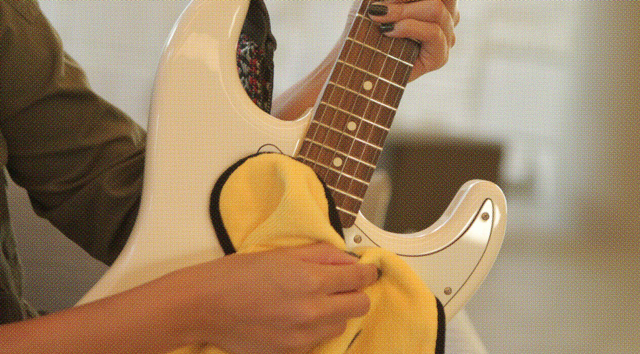
Proper cleaning and conditioning of the instrument is critical to your health, both in the instrument and in your pocket.
Over the years we have seen extreme cases of guitars that have been permanently damaged by owner negligence only in terms of cleaning the instrument.
Without proper care, the guitar will lose value and eventually become impossible to play or regulate due to poor care size.
However, it is not difficult to clean and condition a guitar simply takes a little time and effort.
And that is a worthy investment. Keeping your instrument in neat cleaning conditions will save you a lot of money on future repairs.
But how, clean the guitar for what? it's because?
Before we discuss how to clean a guitar, it's important to understand what the potential problems are and why we need to address them before it's too late.
Two important components that need good cleaning and conditioning are the neck, in this case the scale, and the bridge and general hardware of the guitar.
HOW TO CLEAN YOUR GUITAR
Example of very clean and conditioned scale
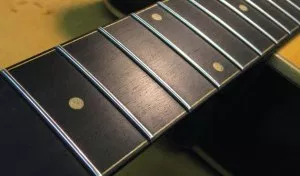
Good cleaning and conditioning of the guitar scale is critical because they are usually made of raw, unfinished or untreated wood.
Maple scales are an exception because they always have some kind of finish and therefore only need to be clean but not hydrated.
Rosewood, ebony and other dark, unvarnished woods should be cleaned and hydrated to prevent dirt and sweat from damaging the wood over time.
With a very clean scale not only looks beautiful but for many guitar players too, the feeling of playing on a clean, well-hydrated scale can be priceless!
Why, why and how!
As we touch dead skin cells, sweat and dirt accumulate on the guitar neck and end up clustering around the frets.
This is not only ugly, but it can eventually accumulate moisture, acids and salts from the sweat itself that can deteriorate the wood of the scale, and may even get to a rotting state of the wood of the scale which would cause frets to fly off to all that It is side.
HOW TO CLEAN YOUR GUITAR
Example of poorly maintained scale, accumulation of dirt near the frets.
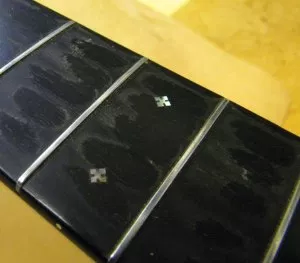
We always know when an arm has been badly treated, especially when we are re-fretting and find a bog, alias that disgust, under the frets that in turn have the green locks of so much oxidation.
HOW TO CLEAN YOUR GUITAR
Frets with the green latches, rust from poor care.
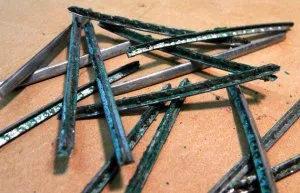
Cracks are another terrifying by-product of wood scale dehydration. When the sweat evaporates it can dry up the scale causing it to crack.
How to clean your guitar
Scale with dryness cracks
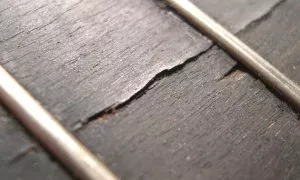
The electrical part is also another point you may suffer from dead skin cells and sweat. The acids that come with the sweat can corrode the pickup coils winding, causing them to stop working.
This can also happen if you have the habit of having a beer while playing. This same factor can affect potentiometers and switches.
How to clean your guitar
Oxidation on electrical part.
Many string and accessory manufacturers offer conditioners and guitar cleaners.
But be aware that most of these products, including lemon oil, contain harmful chemicals and solvents that can damage the wood and finish of your guitar.
Dangers
Avoid anything that contains d-limonene, alcohol or silicone.
A derivative of oil extracted from citrus peel, d-limonene, contains natural acids. These acids can act as a solvent and "break" finishes and cause the wood to begin to deteriorate.
Alcohol dries out exposed wood parts, such as easels in the case of the guitar, and other areas with unfinished wood.
When it reaches the finish of some guitars it can create a whitish look.
Already using silicone products in the composition can prevent the wood from "breathing" and can also cause whitish appearance in some finishes.
An important thing is also the humidity control of the instrument, because with the drying of the wood there may be cracks.
A good idea is to control the humidity of the instrument's location, even if you need a humidifier.
New guitars are more prone to moisture cracking than older or vintage instruments.
This is because older instruments were built with wood from the natural drying process, ie decades spent drying before becoming instruments.
New guitars are more prone to moisture cracking than older or vintage instruments.
This is because older instruments were built with wood from the natural drying process, ie decades spent drying before becoming instruments.
With this the wood parts become more stable and reliable, but for this we have to wait decades before the wood reaches this stage.
Newer guitars often use woods that are dried in greenhouses, artificial drying, which speeds up the process of aging of the woods, but this does not produce the same result of natural drying and are therefore more susceptible to changes in temperature and humidity.
This movement of the wood pieces helps the instrument varnish to crack in some cases.
How to clean your guitar
Cleaning and conditioning.
First let's start with cleaning the scale.
And the first step here is to get all the ropes off. Yes, all of them!
People often say:
"Wow, but if I take all the ropes, I'll damage my arm. I will not go?
Or…
- My friend said that taking off all the ropes will make the arm explode!
Cleaning
I've been working on this for a long time and we've never seen an arm explode! It's not that time we put a bomb in it!
The fact is that it will not explode and you will not damage it if you remove all the ropes.
The wood has an excellent memory, so you don't have to worry about removing all the strings.
There are several ways to clean the scale, one of which is to use steel wool. This works great, especially when you want to make your frets regain that glow.
To take all the tallow off the scale always use steel wool towards the wood grain, this way you will not leave scratches on your scale.
Scrub without applying too much force until all the dirt is removed.
Caution: Do not use steel wool on a glossy finish varnished maple arm. Rubbing steel wool on any shiny finish will make it matte.
Good products to use:
Lemon Oil
Peroba OIL ( it's easies to find in my country)
Water
Those are naturals and works perfectly in the wood
To listen to the audio version of this article click on the play image.

Brought to you by @tts. If you find it useful please consider upvoting this reply.
Interesting tips.
@phabulu, Every tools and things deserves care and users 👥 knowledge while dealing with them and in this way we can use some stuff for Long Term.
Posted using Partiko Android
Congratulations @phabulu! You have completed the following achievement on the Steem blockchain and have been rewarded with new badge(s) :
You can view your badges on your Steem Board and compare to others on the Steem Ranking
If you no longer want to receive notifications, reply to this comment with the word
STOPTo support your work, I also upvoted your post!
Vote for @Steemitboard as a witness to get one more award and increased upvotes!
We'll give you that one ;-) Do you use raw Peroba Oil? Are there other mineral oils that you would recommend?
Definitely an appropriate niche market - natural oils for polishing and preserving wood.
Hey yes, in my country (brazil) we find it really easy raw peroba oil, also another great natural option is lemon oil, that can be done in house, but take a little time, plum oil can be used too, but is expensive, so for me it's easier to get peroba.
Some people use soy oil but is the last option, only use if you don't have any other option.
For guitar, it's only those that I recomend to be used.